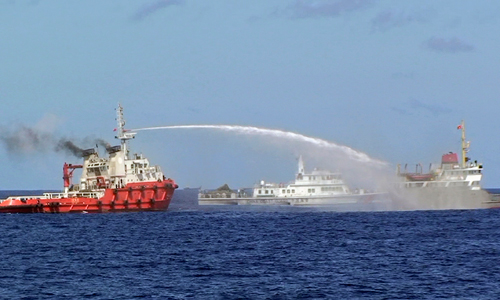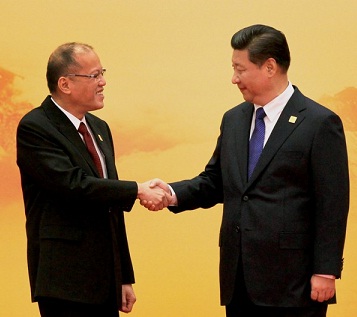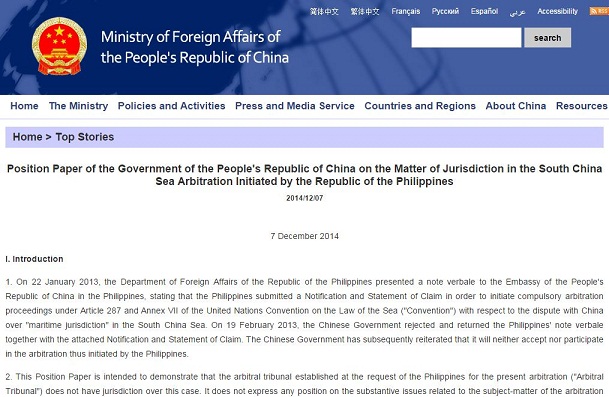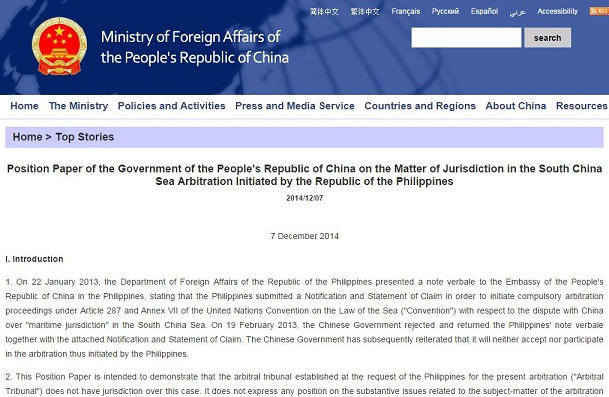Probably so as not to further antagonize China, with whom the Philippines has rekindled relations marked by the meeting of President Aquino with Chinese President Xi Jinping last month on the sidelines of the Asia Pacific Economic Cooperation summit, the statement of the Department of Foreign Affairs in reaction to the statement of Vietnam was sober.
The statement, released three days after Vietnam made public the Dec. 4 submission to the U.N. Arbitral Tribunal in The Hague, said: “PH has had close consultations with Vietnam, bilaterally as well as within ASEAN, on claims and issues in the South China Sea. We now understand that Vietnam has made its position on our arbitration case known to the Tribunal. This is not wholly unexpected, since Vietnam naturally seeks to protect its own interests. What we understand, however, consistent with our previous discussions, is that the Vietnam’s basic position largely accords with ours with regards to the South China Sea.
Asean diplomats in Vietnam were briefed about the submission to the Arbitral Court Dec. 5. Sources at the DFA said Vietnamese Ambassador Truong Trieu Duong met with Foreign Undersecretary Evan Garcia also on Friday and the latter profusely thanked the envoy.
What the Philippines was most happy about was that Vietnam underscored that the Tribunal has jurisdiction on the case and the decision on the Philippine case would help clarify legal issues on the conflict.
Aside from China, Philippines and Vietnam, Brunei, Malaysia and Taiwan are also claiming parts of the South China Sea.
It is in the issue of jurisdiction that even Philippine experts on the U.N. Convention on the Law of the Sea (UNCLOS) are concerned about because the issues raised by the Philippines could be interpreted as matters of territorial dispute and sovereignty, which are outside the scope of the Arbitral Court.
Territorial disputes are under the jurisdiction of the International Court of Justice, which requires the participation of parties involved in the case. China has refused to participate in the international arbitration and prefers bilateral negotiation.
Lack of jurisdiction of the Arbitral Court in the Philippine complaint was stressed by China in its Dec. 7 Position Paper, released three days after Vietnam submitted its statement in The Hague.
“It is the view of China that the Arbitral Tribunal manifestly has no jurisdiction over this arbitration, unilaterally initiated by the Philippines, with regard to disputes between China and the Philippines in the South China Sea,” China said.
Jurisdiction is the Achilles heel of the Philippine suit. The Philippine legal team feels it had remedied that concern because it is not asking the Arbitral Tribunal to rule on who owns Scarborough Shoal or Mischief reef or any of the disputed features in the South China Sea.
The Philippine suit merely asked the Arbitral Court to rule on three basic issues: the validity of China’s nine-dash lines; Low tide elevations where China has built permanent structures should be declared as forming part of the Philippine Continental shelf; and that the waters outside the 12 nautical miles surrounding the Panatag Island (Scarborough shoal) should be declared as part of the Philippines Exclusive Economic Zone.
Vietnam also said it supports the competence of the Arbitral Tribunal in interpreting the provisions of UNCLOS in respect to construction of structures and artificial islands in the EEZ and continental shelves of coastal states.
In a briefing with reporters early this year, then Solicitor General (now Supreme Court Associate Justice) Francis Jardeleza said the Court acceded to their request that they rule on both the jurisdiction and merits of the case.
He said: “There’s so much tactical advantage to that procedure because we are very strong on the merits and by discussing the merits more and more you gain an advantage hoping to convince the tribunal that they should take the case and rule that they have jurisdiction.”
The day after Vietnam submitted its position paper to the Arbitral Tribunal, the U.S. Department of State released a report by Office of Ocean and Polar Affairs, Bureau of Oceans and International Environmental and Scientific Affairs on China’s maritime claim in the South China Sea.
The report ripped apart China’s nine –dashed line map, the number one item in the Philippine complaint.
The report concluded: “…unless China clarifies that the dashed-line claim reflects only a claim to islands within that line and any maritime zones that are generated from those land features in accordance with the international law of the sea, as reflected in the LOS Convention, its dashed-line claim does not accord with the international law of the sea.”
The submission of Vietnam of its position paper with the Arbitral Court and the release of the U.S. report on China’s nine-dash line map are not a coincidence. The Arbitral Court has given China until today, Dec. 15, to submit its comments to the Philippine complaint in the Arbitral Court. With or without China’s participation, the Arbitral Court will proceed with the hearings.





